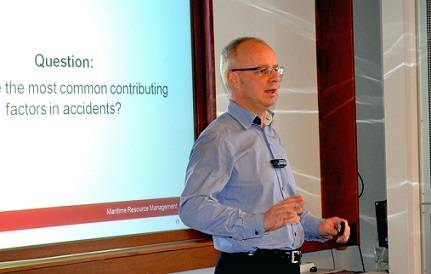Swedish Club Academy Fears Limited Impact of STCW Revision
Several years ago, when the IMO declared that resource management training would be given high priority in the revision of the STCW, The Swedish Club Academy was hopeful that a worldwide mandatory application of resource management would be the key factor in significantly reducing the frequency of maritime incidents and accidents.
“We have been involved in resource management training for 20 years as a response to the large number of accidents caused by human and organizational errors and shortcomings,” said Martin Hernqvist, The Swedish Club Academy’s Managing Director. “Of all the changes to the STCW, it was specifically the requirements related to resource management that we felt would have the greatest impact on safety. Looking at the way the revised STCW now is being interpreted by many of the flag States, we are a lot less optimistic,” said Mr. Hernqvist.
The STCW 2010 Manila amendments became effective on January 1, 2012 with full compliance mandated by January 1, 2017. According to the IMO, the amendments are aimed at bringing the STCW Convention and Code up to date with recent developments and to address anticipated issues. The Swedish Club Academy is concerned that the revised STCW will fail to meet some of the most important training needs of today.
“This is because many flag States define resource management as training focusing on technical knowledge and skills,” Mr. Hernqvist explained. He pointed out that this type of training is already being carried out, and that implementing more of the same will not make a difference. “Simply by looking at the major accidents in our industry it is clear: when attitudes are poor, negative or dangerous, then accidents occur irrespective of what technical skills or knowledge is in place.”
Mr. Hernqvist said that that to be effective, resource management must focus on the human factors area: the non-technical issues and the attitudes of people. This includes interpersonal relationships, teamwork, communication, cultural issues and, most importantly, establishing a willingness to apply what has been learned. “Attitudes is the third critical component of competency alongside knowledge and skills.”
With extensive experience in resource management training, The Swedish Club Academy produced a guide in September, 2011 intended to assist flag States and training providers in the interpretation of the STCW Manila amendments. Martin Hernqvist said, “For the most part, the guide has been very well-received, but over the past two years we have also experienced contacts with flag States and other parties that have been far from positive and encouraging. In the regulatory world, there is a lot of politics and protectionism involved. We have also seen lack of interest and understanding and even cases of corruption. The money-making opportunities overshadow the concerns for safety for some parties. Decision-makers would do well to listen closely to those who actually pay for the consequences of accidents.
www.tscacademy.com

















